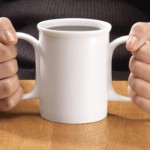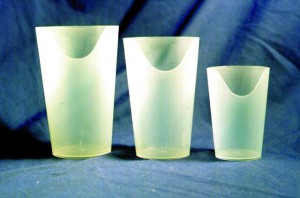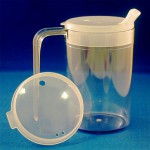- Providing Helpful Healthcare Products Since 1999 | Our Hours: 8 AM - 5 PM CST Mon - Fri
- +1-877-750-0376
Help Your Loved Ones Stay Hydrated
Portable Transfer Aids for Room Mobility [Traveling with Seniors Part 2]
July 23, 2012Ensure a Comfortable Ride [Traveling with Seniors Part 3]
July 31, 2012Help Your Loved Ones Stay Hydrated
Staying hydrated is important for everyone, especially in the summer. Keep your loved ones hydrated with the help of adapted cups and mugs that make it easier.
Staying hydrated is important for everyone, especially in the hot summer months. As we age, the effectiveness of our thirst mechanism declines. Combine this with the host of other complications that affect older people, and the result is an increase in the risk of dehydration. Most of us have probably been dehydrated at one point or another, but seniors especially run the risk of being in a constant state of dehydration. And that can be dangerous because even mild dehydration can worsen other health conditions if not resolved.
Why fluid intake is important
About three fourths of your body consists of water. We are constantly losing fluids by urinating, sweating, and even breathing. If you have ever heard the old “8 cups of water a day” mantra and thought that it was a bit overboard, consider the fact that we lose about 1.5 liters of water a day. If we are exerting ourselves and perspiring more than normal, we lose even more water. Now, you don’t necessarily need to obsess over ensuring your loved one drinks exactly eight cups of water a day, but you should encourage them to drink at meals and some in between meals as well.
Not getting enough fluids can cause negative effects that could have otherwise been prevented. According to WebMD, dehydration can cause the following symptoms in varying degrees of severity.
- Increased thirst
- Dry mouth and swollen tongue
- Weakness
- Dizziness
- Palpitations (feeling that the heart is jumping or pounding)
- Confusion
- Sluggishness
- Fainting
- Inability to sweat
- Decreased urine output
The best answer to dehydration is prevention by drinking plenty of fluids. You can help your loved one achieve that by making it easier for them to drink and by monitoring how much they are drinking to ensure that it is sufficient.
Make it easy
Seniors may have difficulty drinking from traditional cups and glasses, and this barrier might cause them to drink less. But there are many types of adapted cups and mugs that can make it easier. They share all kinds of helpful features. Here are some you should look for.
Extra grip
Seniors with arthritis or who have tremors in their hands benefit from having a bit more cup to hold on to. For example, the Granny Jo Dignity Mug has a handle on each side. This lets the user grasp the mug in a variety of different ways. Whether the cup or mug has a large grip, contoured shape, or has two handles, items in this category offer stability and reduce the risks of drops.
Adapted lids for easy access and less spills
This category includes products such as the Nosey Cup. Normally, when you drink from a cup you have to tilt your head back as your cup becomes empty. But this might be difficult for your loved one if they have trouble swallowing and if they have neck pain or stiffness. The Nosey Cup is adapted so that there is a place for the nose, allowing the user to keep their head upright. Other items in this category include cups with spout lids that reduce splashing and spilling and can be useful if your loved one is lying down.
Transparent cups and mugs let you monitor intake
One important step in helping your loved ones stay hydrated is keeping an eye on how much they drink. You don’t necessarily need accurate measurements, but with opaque glasses it’s hard to know if your loved one is actually drinking all of its contents. Simply encouraging your loved one to drink from transparent cups can help you estimate how much they are drinking and give you the peace of mind in knowing they are staying hydrated.
Find the right combination
Here are a some of the adapted cups and mugs we offer along with what features they include. Depending on your loved one’s individual challenges, you can find the product that would most help them drink more with ease.
Granny Jo Dignity Mug
Offers two handles
Hand to Hand Mug
Large handle and contoured shape; insulated
Independence Long Handle Mug
Large grip and transparency
Independence Two Handle Mug
Transparency and two handles for better grip
Flo-Trol Convalescent Feeding Cup
Adapted lid allows for dribble-free drinking while lying down; transparency
Nosey Cup
Allows drinking without bending the neck or tilting the head; transparency
Prevention is the best medicine
Dehydration can cause negative effects, especially for seniors who may be dealing with other health problems. Fortunately, it is easy to cure and even prevent if you take steps to increase your loved one’s fluid intake and help them stay happy, healthy, and hydrated.
References:
http://www.netdoctor.co.uk/healthy-living/a11669/the-water-myth/
https://www.webmd.com/a-to-z-guides/dehydration-adults#1
https://en.wikipedia.org/wiki/Dehydration



